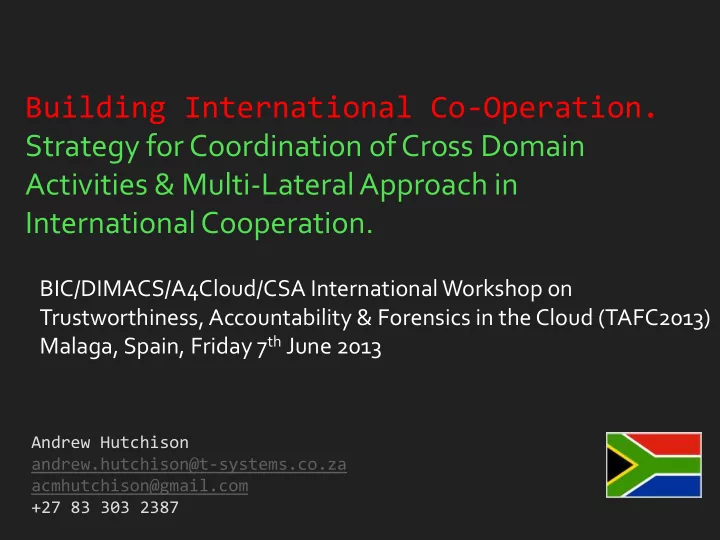

Building International Co-Operation. Strategy for Coordination of Cross Domain Activities & Multi-Lateral Approach in International Cooperation. BIC/DIMACS/A4Cloud/CSA International Workshop on Trustworthiness, Accountability & Forensics in the Cloud (TAFC2013) Malaga, Spain, Friday 7 th June 2013 Andrew Hutchison andrew.hutchison@t-systems.co.za acmhutchison@gmail.com +27 83 303 2387
Cloud computing as a “game changer” • e.g. EU economy Challenges : • standards, certification, data protection, interoperability, lock-in, legal certainty How to enhance trustworthiness in the cloud ... • Technical & policy mechanisms to enable them Discuss how public, private & research communities can increase confidence in use of cloud computing • Ongoing research work; future research challenges – H2020
Privacy, ethics and accountability Trustworthy host platforms for accelerated research & education Strategy for co-ordination of cross domain activities & multi-lateral approach in international cooperation
Continually building up our contact base in South Africa. In the first years, working groups focussed on technical aspects of network information & cyber security and human oriented approaches for trust, privacy and security and continue to work on these (aligning research topics between the countries). The point of this to give guidance to Commission where they should have research funding for joint international collaborations in Horizon 2020, the next research programme for 2014 - 2020. In parallel, now building up a group focussing on a longer term strategy including logistical aspects, including the necessary models, mechanisms and processes required for the enablement of international cooperation.
Focus not only on current field of research but also dedicate some time on what you feel is the necessary future research challenges and work required • one of the objectives of the workshop is to highlight areas where consortia can be formed in Horizon 2020 and other programmes. • how international cooperation could benefit this research work in the future, highlighting specific reasons and rationales for it.
13
17
18
T-Systems grew from 500 people in 2000 to 2500 in 2012 Largest full ICT service outsourcer in South African market Supporting key SA enterprises like Eskom, Transnet, SASOL, DWA etc
Multi-domain parallel-running Alert and reaction Predictive security analysis Highly-scalable, dependable and processes generation multi-level event collection Actions and Counter- measures Trustworthy event collection Olympic Games Multi-level security event modeling Languages Security analysis and EVENTS notification POLICIES Mobile money transfer service RELATIONS REACTIONS Multi-level event Process and attack correlation simulation Resilient framework CI Process architecture Control (Dam) Security-aware processes Managed Event, Process Models and Event and Enterprise Service Attack Models Information Collection Infrastructures Resilient event processing and integration Scenarios Advanced SIEM Framework Prototypes
Security Operations Centre Anti-Virus SOC Anti-Spam Router Email Spooler Internet Internet Gateway Cloud Monitoring Event Vulnerability Correlator Analysis Firewall & IPS Internet Gateway Router URL Filtering Firewall & Anti-Virus Proxy Server Remote IPS Authentication Server T-Systems MPLS Cloud Firewall & Firewall & IPS IPS Firewall & Software Update Server IPS Campus/Remote Site Servers Mail Server IDM HIPS Anti-Virus Anti-Spyware Data Centre Site Router Router (PKI Infrastructure) (Strong Authentication) Software HIPS Anti-Virus Update Local Novell IDS Anti-Virus Anti-Spam Server Server Anti-Spyware Firewall & Data Centre IPS 28
T- Labs „Anomaly Detection and Early Warning System“ ( ADEWaS) Project. T-Labs „Enhanced T-Labs „Purenet“ T-Labs „Model Database Security Project. Driven Security & Services (EDSS) Development “ “ Project. (MDSD) Project.
Sometimes viewed as a “field trial” ! Smaller market Close(r) to clients Open-ness to change Like to be early adopters (e.g. pre-paid electricity & mobile, ATMs, Internet banking etc) Willingness to take calculated risks (less punitive regime?)
http://internationalaffairs.unibas.ch/joint-programmes/swiss-south-africa-joint-research-programme-ssajrp /
CHF600 000 in 2011 for 9 joint projects
Strong leader / “champion” in Uni Basel Multi-disciplinary focus dilutes Modes of funding are typical (joint projects, exchange, student support, etc) Forums Lack of industry involvement (e.g. IBM ZRL, Google Zurich, Pharmaceutical companies etc) “Best kept secret”
BIC is advocating a more multi-lateral cooperation model ... needed especially for cyber security Has a slightly extended model of working groups, including one called an Extended Working Group (EWG ) in country Recently launched an EWG in India (Mr. Abhishek Sharma of the BIC International Advisory Group (IAG) presenting India progress and launch ... aim to duplicate in South Africa and Brazil. Goal: to set up an EWG in South Africa in the next months.
Industry • International companies R&D entities • “Local” companies Startups? BEE Academic • Universities Funding: national, international, industry (local / international)
Develop expertise in South Africa Increase number of qualified graduates (especially post-graduate) Critical infrastructure requires special consideration and protection Sophistication (and globalisation) of attacks continues to grow at rapid pace Joint European / South African projects can improve situation at many levels
Recommend
More recommend